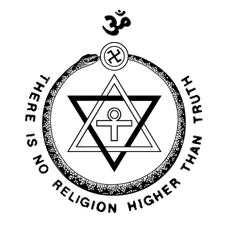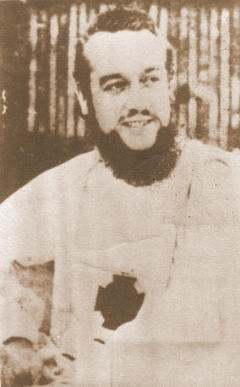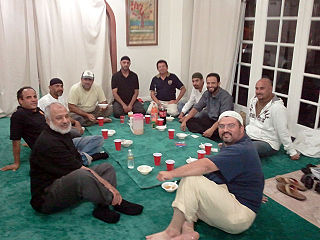
Religious pluralism is an attitude or policy regarding the diversity of religious belief systems co-existing in society. It can indicate one or more of the following:
Universalism is the philosophical concept and a theological concept within Christianity that some ideas have universal application or applicability.

A tariqa is a religious order of Sufism, or specifically a concept for the mystical teaching and spiritual practices of such an order with the aim of seeking haqiqa, which translates as "ultimate truth".

The Theosophical Society is the organizational body of Theosophy, an esoteric new religious movement. It was founded in New York City, U.S. in 1875. Among its founders were Helena Blavatsky, a Russian mystic and the principal thinker of the Theosophy movement, and Henry Steel Olcott, the society's first president. It draws upon a wide array of influences among them older European philosophies and movements such as Neoplatonism and occultism, as well as parts of Asian religious traditions such as Hinduism, Buddhism, and Islam.

The perennial philosophy, also referred to as perennialism and perennial wisdom, is a school of thought in philosophy and spirituality that posits that the recurrence of common themes across world religions illuminates universal truths about the nature of reality, humanity, ethics, and consciousness. Some perennialists emphasize common themes in religious experiences and mystical traditions across time and cultures; others argue that religious traditions share a single metaphysical truth or origin from which all esoteric and exoteric knowledge and doctrine have developed.

Ascended masters in a number of movements in the theosophical tradition are held to be spiritually enlightened beings who in past incarnations were ordinary humans, but who have undergone a series of spiritual transformations originally called initiations.

The Theosophical Society in America (TSA) is a member-based nonprofit organization dedicated to the teaching of Theosophy and affiliated with the international Theosophical Society based in Adyar, Chennai, India. The name "Theosophical Society in America" was legally adopted by the American Theosophical Society in 1934. Previously, other organizations had used the same name during the years 1895–98 and 1898–1908.

Serge Raynaud de la Ferrière was a French Initiatic philosopher.

The Theosophical Society Point Loma was based at the Theosophical community of Lomaland in the Point Loma district of San Diego, California from 1900 to 1942, and the international headquarters of a branch of the Theosophical Society from 1900 to 1942. It moved to Covina in Los Angeles County in 1942 and was the branch's international headquarters to 1945, when it moved to Pasadena, California and became the Theosophical Society Pasadena, the branch's current international headquarters.

Mexico has a religious minority of Muslims, mostly constituted by converts, and Mexicans of African, Asian, European, and South American origin, as well as their children, born in Mexico.

Kabir Panth is a Sant Mat denomination and philosophy based on the teachings of the 15th century saint and poet, Kabir. It is based on devotion to him as one guru as a means to salvation. The adherents of Kabir Panth are from many religious backgrounds as Kabir never advocated change of religions but highlighted their limitations. According to some scholars, this tradition belong to Hindu denomination of Vaishnavism with universalist leanings. In respect of Kabir, his followers celebrate Kabir Jayanti.
The Great White Brotherhood, in belief systems akin to Theosophy and New Age, are said to be perfected beings of great power who spread spiritual teachings through selected humans. The members of the Brotherhood may be known as the Masters of the Ancient Wisdom, the Ascended Masters, the Church Invisible, or simply as the Hierarchy. The first person to talk about them in the West was Helena Petrovna Blavatsky (Theosophy), after she and other people claimed to have received messages from them. These included Helena Roerich, Alice A. Bailey, Guy Ballard, Geraldine Innocente, Elizabeth Clare Prophet, Bob Sanders, and Benjamin Creme.

Agni Yoga or the Living Ethics, or the Teaching of Life, is a Neo-Theosophical religious doctrine taught by Helena Roerich and Nicholas Roerich from 1920. The term Agni Yoga means "Mergence with Divine Fire" or "Path to Mergence with Divine Fire". This term was introduced by the Roerichs. The followers of Agni Yoga believe that the teaching was given to the Roerich family and their associates by Master Morya, the guru of the Roerichs and of Helena Blavatsky, one of the founders of the modern Theosophical movement and of the Theosophical Society.

The Egyptian Organization for Human Rights (EOHR), founded in April 1985 and with its headquarters in Cairo, Egypt, is a non-profit NGO and one of the longest-standing bodies for the defense of human rights in Egypt. It investigates, monitors, and reports on human rights violations and defends people's rights regardless of the identity, gender or color of the victim. EOHR faces any human rights violations made either by governmental or non-governmental parties. It is registered with the United Nations and works with other human rights groups.
The Baháʼí Faith was first introduced in China during the lifetime of its founder, Baháʼu'lláh (1817–1892).

Sushil Kumar was a Jain teacher and monk. He was a self-realized master who devoted more than 50 years to promoting non-violence, peace and knowledge of the self.
Félix Díaz Ortega was a Venezuelan ex-military, medic and far-right politician, founder and leader of the nationalist New Order party. He died in his hometown on February 6, 2006.
Non-denominational Muslims are Muslims who do not belong to, do not self-identify with, or cannot be readily classified under one of the identifiable Islamic schools and branches. Such Muslims do not think of themselves as belonging to a denomination but rather as "just Muslims" or "non-denominational Muslims." Muslims who do not adhere to a sect are also known as non-sectarian Muslims.

Amel Association is a Lebanese, non-sectarian, non-profit non-governmental organization (NGO), created by Kamel Mohanna in 1979, in response to the Israeli invasion of 1978.











